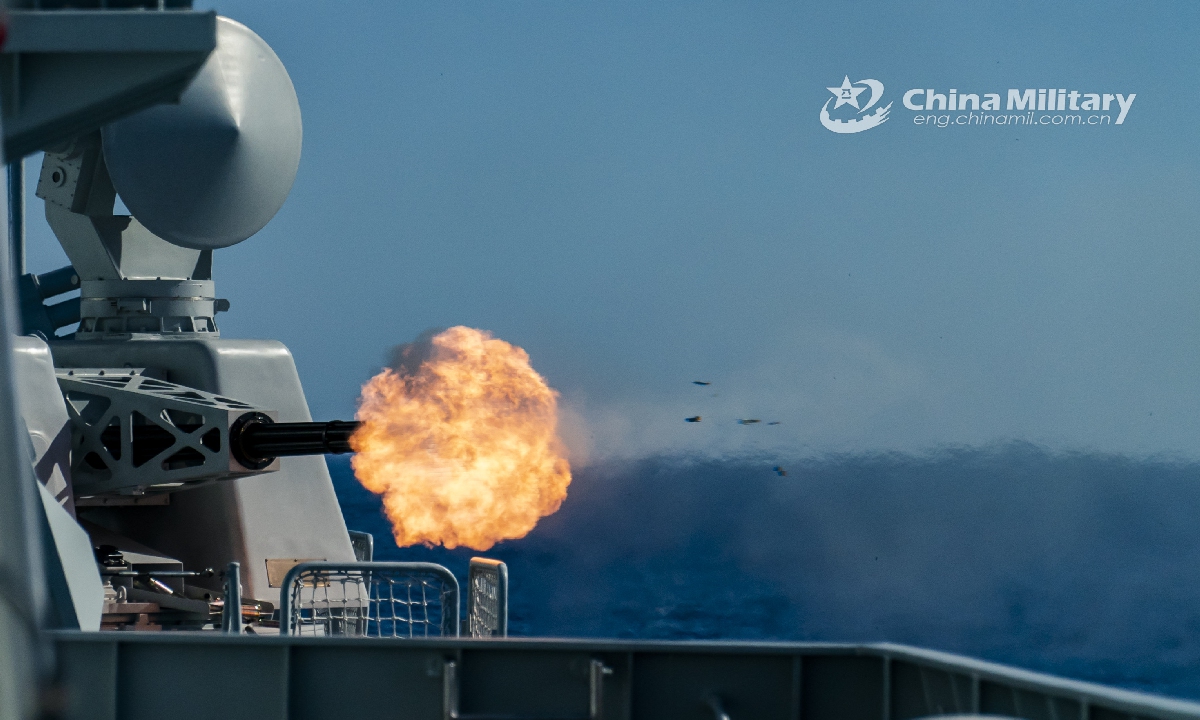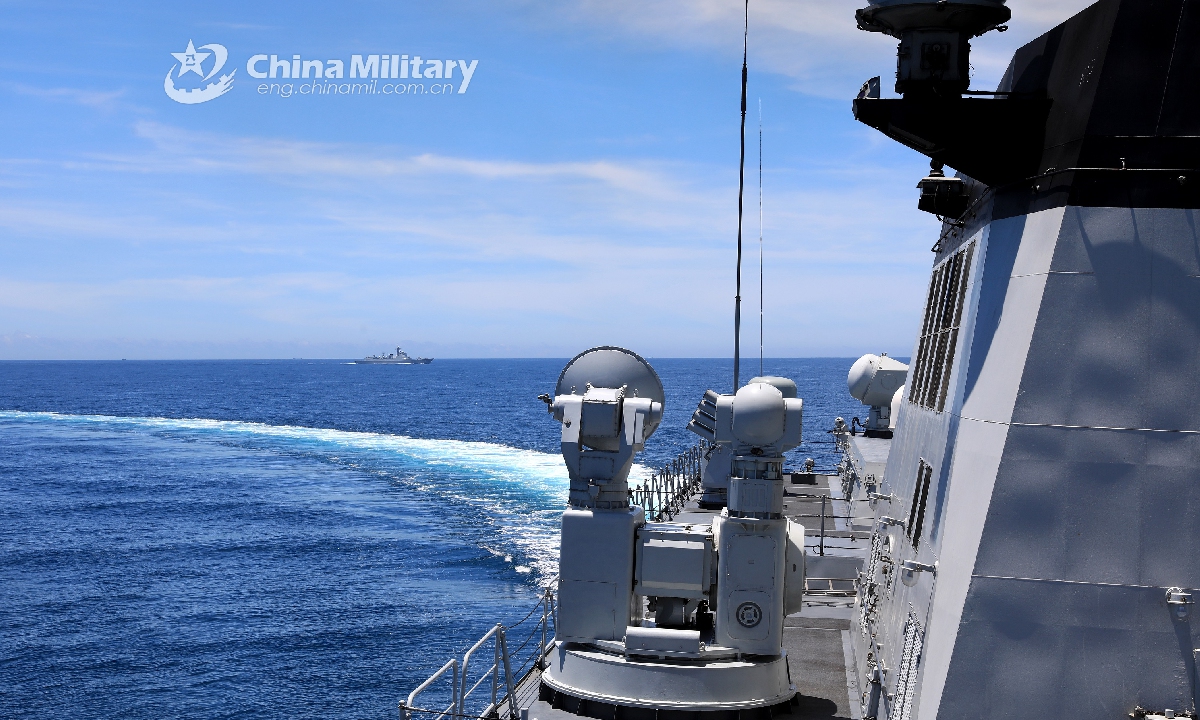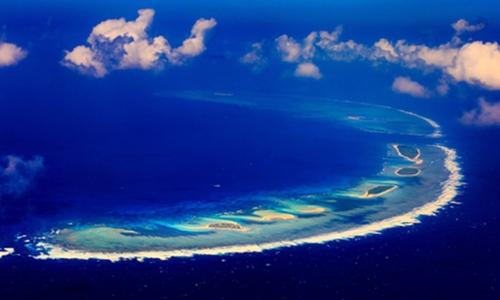Inciting confrontations in S.China Sea part of US ‘isolate China’ strategy
By Cao Siqi Source: Global Times Published: 2020/7/14 21:38:40 Last Updated: 2020/7/14 22:48:40
Inciting confrontations in the region part of ‘isolate China’ strategy

The guided-missile frigate Hengyang (Hull 568) attached to a destroyer flotilla with the navy under the PLA Southern Theater Command fires its close-in weapons system at a mock sea target during a maritime live-fire training exercise in waters of the South China Sea on June 18, 2020. (eng.chinnmil.com.cn/Photo by Li Wei)
Following a rare move to send two aircraft carriers to the South China Sea, the US threw down the gauntlet to China again by issuing a statement on Monday that alleged most of Beijing's claims in the sea are "completely unlawful," in an apparent attempt to sow discord between China and littoral countries, and undermine the hard-won stability in the region.
Despite the US - still plagued by the COVID-19 epidemic - losing the support of more and more allies amid the deteriorating China-US ties, the superpower has never stopped its ambitions to isolate China by unremittingly launching ideological, technological and trade wars in a bid to maintain its dominance in the world.
In the latest statement, the US overturned its long-held somewhat neutral policy on the sovereignty over the South China Sea and accused China of using intimidation to undermine the sovereign rights of Southeast Asian coastal states in the waters and replacing international law with "might makes right."
Facing closer contacts between China and ASEAN members in recent years, especially the progress achieved on the South China Sea conflicts since 2016 and combined efforts to fight the global health crisis, the US seemed to intend to show, via the statement, that the lord of the world is hastening to strengthen its strategy featuring China as its imaginary enemy, as its Indo-Pacific Strategy Report released in 2019 envisaged.
Analysts warned that the odds are the US and China might enter into direct conflict in the waters due to misjudgment, like the clash between a Chinese fighter jet and a US reconnaissance aircraft in 2001. And if the US continues to adopt such a strategy, competition between the two major powers in the sea will increasingly resemble a cold war.

The Type 054A guided-missile frigate Yulin (Hull 569) and the Type 052D guided-missile destroyer Hohhot (Hull 161) attached to a destroyer flotilla with the navy under the PLA Southern Theater Command steam in a stern formation during a maritime maneuver operation in waters of the South China Sea on June 18, 2020. (eng.chinnmil.com.cn/Photo by Li Hongming)
Sowing discord
Coming on the fourth anniversary of the South China Sea "arbitration," the US statement criticized China for bullying Southeast Asian coastal states out of offshore resources and asserting unilateral dominion. The US criticism was seen by Western analysts as a full-throated endorsement of the tribunal's ruling.
The US statement followed a call issued on Monday by Philippine Foreign Secretary Teodoro Locsin Jr. for compliance with the arbitration ruling.
China has solemnly declared that the award is null and void and has no binding force. China neither accepts nor recognizes it. Beijing and Manila have reached consensus on shelving the decision of the South China Sea arbitration since the second half of 2016.
"The timing proved that Washington has taken advantage of opposition in the Philippines and other countries to sow discord. It is trying to instigate ASEAN members to be tougher against Beijing in terms of the South China Sea issue," Chen Xiangmiao, a research fellow at the Hainan Province-based National Institute for South China Sea Studies, told the Global Times on Tuesday.
China's conflicts with Vietnam, the Philippines, and Malaysia on the South China Sea had been declining since 2016. Positive momentum has been built toward the resolution of maritime disputes.
In 2019, progress was made via a dual-track approach on multilateral and bilateral levels. Disputes between China and the other claimant states, including the Philippines, Vietnam, Malaysia and Brunei, were controlled and stability was generally maintained in the South China Sea.
However, the situation has changed. The South China Sea issue became a focal point grabbing headlines in major international media outlets, and occupying space on the agenda of many bilateral and multilateral political summits and academic conferences. Conflicts between China and Vietnam and Malaysia over oil and gas development, and maritime jurisdiction have worsened.
"With faster progress in negotiating the text of the Code of Conduct in the South China Sea (COC), and the close cooperation between China and Southeast Asia in fighting the COVID-19 pandemic, the US shook its legs," Chen said, noting that the US has tried to intensify its competition with China for influence and leadership in the region, and new turbulence is on the horizon.
Negotiations over the COC may encounter unexpected hurdles, he predicted.
The US has always regarded itself as a loyal defender of the United Nations Convention on the Law of the Sea (UNCLOS), and thought it has the responsibility to safeguard the freedom of navigation and overflight, and to maintain global maritime peace.
With the support of the alliance and partner countries, the US is the owner of modern international institutional powers and has the right to interpret the rules of international law, which observers believe are the reasons why the country has the courage to stick its nose into China on the South China Sea issue in the past decades.
The Chinese Embassy in the US and the Chinese Foreign Ministry rebuked the statement on Tuesday, saying that the US is not a country directly involved in the disputes, but continues to interfere in the issue. In the name of preserving stability, the US is flexing its muscles, stirring up tensions and inciting confrontations in the region.
Under the pretext of endorsing rules, the US is using the Convention to attack China while refusing to ratify the UNCLOS itself. Under the pretext of upholding freedom of navigation and overflight, the US is recklessly infringing on other countries' territorial sea and airspace, and throwing its weight around in every ocean of the world, the Chinese Embassy said.
The international community sees exactly who is trying to build a "maritime empire." The behavior of the US has exposed its naked logic of power and hegemony, and it is the US which is a disrupter and troublemaker of peace and stability in the region, analysts noted.
Wu Xinbo, dean of the Institute of International Studies at Fudan University in Shanghai, said it is clear that the US is instigating the world, especially countries neighboring China, to increase their confrontations with China, and further decouple from China.
The US and Malaysia are not allies, and there is no treaty obligation for the US to protect the country. "It is evident that the US is telling Malaysia that you do not have to be afraid of confronting China. I am supporting you. " Wu told the Global Times on Tuesday, noting that it is an old trick played by the US to fool other nations and turn them into pawns.

Xisha Islands in the South China Sea Photo: VCG
Prepare for the worst
Experts predicted that the US can be anticipated to step up military activities, make more forward deployments, and take provocative actions related to the South China Sea issue more often, reminding Southeast Asian countries not to fall in a "geopolitical trap" thus become a victim of the US' strategy to contain China.
Close cooperation between the US and Vietnam on the South China Sea issue may create a new "black swan" event, Chen said.
Since China and Vietnam confronted each other on the Wan'an Tan in 2019, US diplomats and media outlets have frequently voiced their support for Vietnam. The two countries seized this opportunity to step up their defense and security cooperation on intelligence sharing, port calls by military vessels, and arms aid.
Vietnam, which holds the ASEAN rotating presidency and a non-permanent seat in the UN Security Council in 2020, may take new steps to internationalize and expand the South China Sea issue, analysts predicted.
They suggested China prepare for the worst as the US may take Vietnam as its new "agent" in destabilizing the South China Sea, and use the Asian country as an important base for forward deployment of its military and coast guard, stepping up intelligence gathering, reconnaissance, and containment of Chinese activities in the South China Sea.
China has reiterated that China's oil and gas development and fishing activities in the South China Sea are all carried out in waters under China's jurisdiction. China has always been committed to negotiating with countries surrounding the South China Sea to shelve maritime disputes, and promote joint development of oil and gas resources.
Maritime claims are just one of several areas where the administration of Donald Trump has turned increasingly aggressive to China, amid a swath of issues ranging from technology and national security, to borderland and Hong Kong affairs.
The next battlefield that the US aims to besiege China might be in Central Asia in the name of human rights, Wu said.
He also predicted the US will also likely shift more of its resources to the Taiwan Straits and create more trouble there.
Newspaper headline: US impairs S.China Sea stability
Posted in: POLITICS